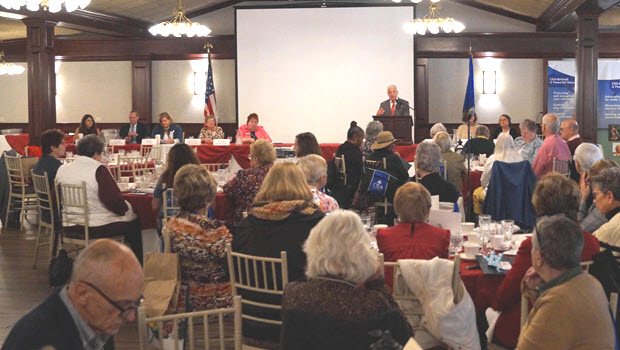Some CEA-Retired members left the classroom last June, while others stopped teaching more than two decades ago, but the commitment of all retired members to public education and the teaching profession remains strong.
“Membership in the profession starts the day you decide you want to be a teacher, and it never ends, because being a teacher is not something you ever actually leave behind,” CEA President Kate Dias told CEA-Retired members gathered for their annual fall meeting. “You are a teacher from the minute you decide you’re going to be a teacher.”
The meeting at the Aqua Turf Club in Southington Wednesday provided retired members with the opportunity to connect with one another and hear from CEA and CEA-Retired leaders about legislation the organizations will be pushing in Congress and the State Legislature this year.
CEA-Retired President William Murray told members, “You are part of the 3.5 million membership of NEA and issues such as Social Security, Medicare, pensions, and the repeal of WEP/GPO are at the forefront of NEA-Retired’s agenda.”
Murray also talked to retired members about CEA-Retired’s recent legislative accomplishments at the state level and the organization’s priorities going forward. He explained that CEA led the original proposal that resulted in a 50% exemption of the state income tax for teachers’ pension income and that CEA-Retired also successfully passed a bill that led to the doubling of the insurance supplement to retired teachers not eligible to be on the state’s health insurance plan.
In order to ensure these successes continue, Murray urged all members to get involved. With recent sharp increases in the cost of living, which particularly affect those on a fixed income, retirees have realized there’s a need to adjust the state statute that prescribes the formula that calculates the cost of living adjustment (COLA) for retiree pensions.
“It’s a legislative issue, not anything the State Teachers’ Retirement Board can fix. We need legislation that reflects a more accurate cost of living formula,” he said.
He also urged CEA-Retired members to vote in an election that is happening right now for two seats to the State Teachers’ Retirement Board. CEA-Retired has endorsed Maureen Honan and Mary-Beth Lang, two highly experienced candidates whose credentials will ensure retired teachers are well represented on the board. Learn more about the candidates. For decades, active and retired teachers have served on the STRB in an effort to ensure the protection and smooth administration of retiree benefits. Bipartisan legislation that passed last spring added two new seats to the STRB, giving retirees greater representation on the board.
CEA Legislative Coordinator Louis Rosado Burch has been working with the CEA-Retired Legislative Commission and co-chairs Miles Cohen and Karen O’Connell to ensure CEA’s legislative agenda reflects the entirety of CEA’s membership–retirees included.
“Fully funded pensions and health care continue to be top priorities,” Rosado Burch said. He added that other retiree legislative priorities include COVID hero pay for active and retired teachers who taught during the pandemic and an increase in the income limit for the 100% income tax exemption for pension and other annuity income.

State Senator Julie Kushner was the event’s keynote speaker.
“You all have been essential in helping to craft this agenda, and we really appreciate the role that you’ve played,” he said.
The meeting’s keynote speaker, State Senator Julie Kushner, is a strong supporter of teachers and public education who earned a perfect 100 on CEA’s legislator report card. She chairs the Labor and Public Employees Committee and the legislature’s Indoor Air Quality Working Group and serves on the Education Committee. She talked to retirees about her long-time support for teachers’ unions and the work they do to improve public education.
Referring to last year’s legislative proposal to give all teachers who worked through the pandemic a pension credit, Kushner said, “I can’t understand why some people in the Senate and House don’t get it. This is such an easy way to make a difference for teachers who put everything on the line.”
She continued, “Teaching is an incredibly difficult job. I really appreciate all you’ve done, and you can count on me for anything you need in the legislature, because education is one of my top priorities.”
WEP/GPO Update
A major goal for CEA and CEA-Retired at the national level is the repeal of the government pension offset (GPO) and windfall elimination provision (WEP)–laws that penalize educators by reducing the Social Security benefits they can receive in retirement. While educators have worked for years to repeal these laws, a bipartisan bill now before Congress puts that goal within reach.
CEA Vice President Joslyn DeLancey explained multiple bills before Congress deal with WEP/GPO. By far the best, Congressman John Larson’s Social Security 2100 would fully repeal WEP/GPO and significantly enhance Social Security for everyone across the board, with a mechanism for funding the changes. Unfortunately, DeLancey said, it hasn’t moved forward.
The Social Security Fairness Act, HR 82, while more limited in scope, fully repeals WEP/GPO and has 295 co-sponsors. “This bill is the closest we’ve been to repealing WEP/GPO since their existence. It has strong bipartisan support, and it’s moving,” DeLancey said.
She added that CEA is looking at creative ways to put pressure on members of Congress from other states as Connecticut’s delegation is already in full support of repeal. She shared CEA’s WEP/GPO webpage, which provides a wealth of resources on understanding and repealing WEP/GPO.
“Not only is WEP/GPO an issue for retirees, but our ability to recruit and retain teachers is also significantly impacted by these penalties,” said Dias, who has been asked to present with DeLancey at upcoming NEA meetings on the issue. “We’re putting together some training, and we’re going to lead the conversation. Our goal is to do the hardest thing of all, which is to make people from traditionally non-impacted states feel impacted and understand why this must change.”







